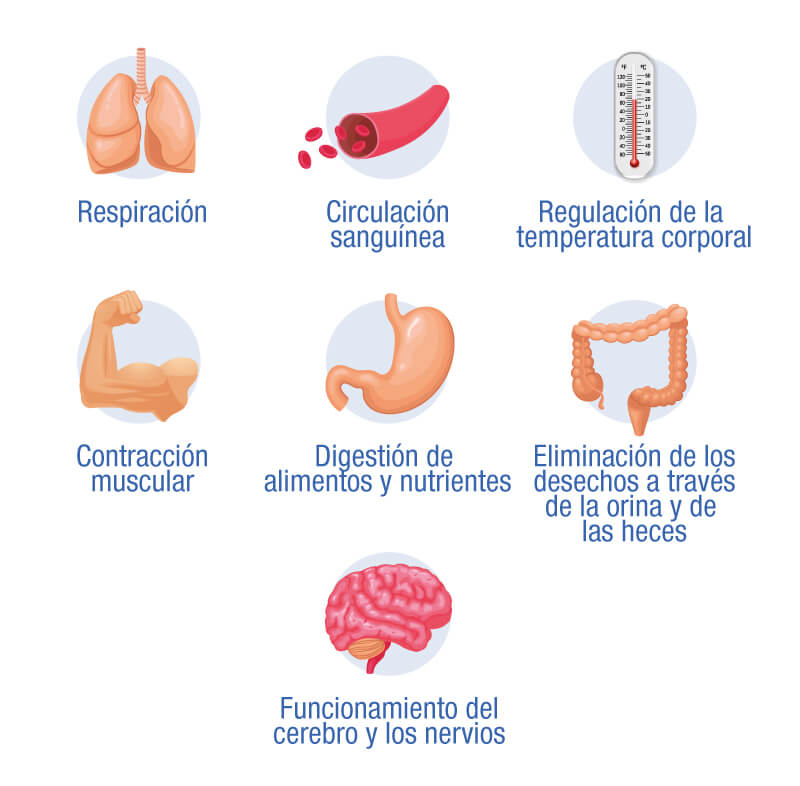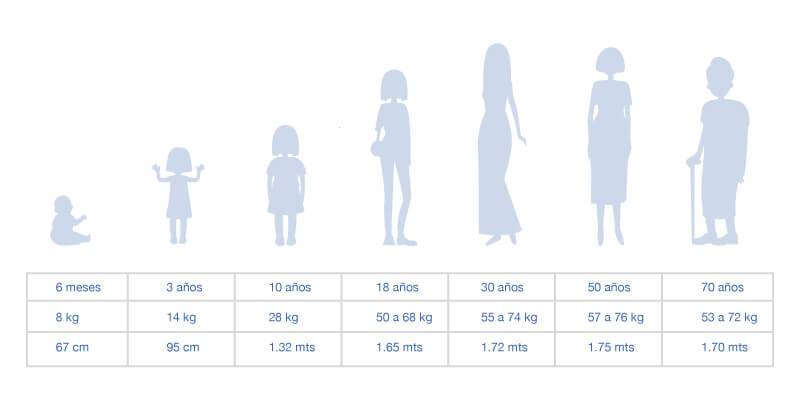How to have an accelerated metabolism in a healthy way (advantages and disadvantages)

There are people who say they gain weight just by drinking water. Others claim to eat too much and nothing and gain weight. To find the reasons for both types of people, we must look at the functioning of their accelerated metabolism.
Many want to know how to improve metabolism for the simple fact of being able to burn calories in record time. They dream of eating whatever and not gaining weight.
But, although speeding up has its advantages, not everything is perfect.
Therefore, I am going to give you complete information so that you can see the subject from its different angles and tell you what you can do to find the balance that allows you to achieve the body you want.
What is metabolism?
Metabolism is a constant process that begins from the moment of conception and ends when we die. It is vital for absolutely all forms of life: microscopic, animal, plant and human beings.
If the metabolism stops in a living being, death simply occurs.
In humans, it refers to all the physical and chemical processes in the body that transform the energy contained in the food we eat into the fuel we need for all the activities we do:

What is fast metabolism?

The body's proteins control the chemical reactions of metabolism, which are coordinated with other bodily functions.
Simultaneously, thousands of metabolic reactions take place in our bodies at the same time, all of them regulated by the same body, which make it possible for our cells to be healthy and function correctly.
The accelerated metabolism is responsible for the fact that when we consume proteins, carbohydrates and fats, they are broken down by the action of enzymes into smaller units: amino acids, sugars and fatty acids.
These will pass into the bloodstream to be digested by cells where other enzymes act to accelerate or regulate the chemical reactions responsible for "metabolizing" these compounds.
During these processes, the energy from these compounds can be released for use by the body or stored in body tissues, especially the liver, muscles, and body fat.
Anabolism and catabolism

The waste products of accelerated metabolism are expelled by the body through the skin, kidneys, lungs and intestines.
Among the habits that favor both constructive and destructive metabolism we have the following:
- Nutrition : we have to give the body enough energy so that it can perform its functions well. It is important to take into consideration the intake and origin of calories; To achieve muscle construction, a sufficient supply of good quality protein is essential.
- Energy after exercise: once our muscle glycogen reserves are exhausted, after intense exercise, it will be necessary to replenish them, some complex carbohydrate is indicated for this moment.
- Good fats : Fats are necessary to maintain good health. Moderate portions of extra virgin olive oil, avocado, nuts, coconut oil, fats from oily fish,
- Hydration : it is important to keep the body well hydrated
- Rest : during sleeping hours the body regenerates, which is why you should sleep 8 hours a day.
- Stress control : when we are under a lot of stress, the body generates a hormone called cortisol that promotes muscle catabolism and fat accumulation.
- Excess physical exercise : more is not better. If we do more exercises without respecting the recovery processes, we run the risk of causing fatigue, poor performance, discomfort and even a greater risk of injury.
What factors regulate it?

The metabolic process to obtain energy is exactly the same in all human organisms, as it is essential to preserve life.
However, the speed with which these metabolic reactions are carried out depends on other factors and an accelerated metabolism is what makes the difference between a person who loses weight quickly and another who does not.
The factors that regulate body metabolism are the following
- Body size and composition : There is a relationship between body mass and energy needs. Therefore, larger individuals or those with more muscle mass need more energy or calories, even at rest. The larger the size, the higher or faster the metabolism will be.
- Gender and hormones: Men usually have less fat mass and more muscle mass than women of the same age and weight. This is because they have greater production of testosterone in their body, which translates into greater caloric consumption. Women who are of postmenopausal age tend to increase their fat deposits due to hormonal changes, mainly due to the lack of estrogen production by the ovaries.
- Age: with increasing age, there is a tendency to lose muscle mass and strength, this is a degenerative process called sarcopenia. It also decreases calorie consumption, which is why the metabolism becomes slower or less efficient.
According to these factors, people will release or store energy, which implies that they will maintain their ideal weight or be overweight, which is why they must be monitored: food portions, muscle size and physical activity carried out in the environment. day.
Problems that may affect you
In most living beings, the metabolism works efficiently and effectively without us even having to think about it.
But sometimes a person's metabolism can cause problems known as metabolic disorder. It is any condition caused by an abnormal chemical reaction in the body's cells.
Most metabolic disorders are related to the existence of abnormal concentrations of enzymes or hormones in the blood, or to problems in their functioning.
When certain chemicals cannot be metabolized or are metabolized defectively, it causes an accumulation of toxic substances in the body or a deficiency of substances necessary for the normal functioning of the body; Both situations can cause serious symptoms.
Metabolic diseases
The most common diseases and metabolic disorders include the following:
- Galactosemia : is a congenital metabolic disorder. Babies born with this problem have difficulty metabolizing or assimilating the simple sugar enzyme or galactose. The sugar enzyme is also found in dairy products.
- Phenylketonuria : Another congenital disorder caused by a defect in the enzyme responsible for breaking down the amino acid phenylalanine, necessary for normal growth and protein manufacturing.
- Hyperthyroidism : appears when the thyroid gland produces an excessive amount of thyroxine, which accelerates basal metabolism. It causes symptoms such as weight loss, rapid heart rate, hypertension, prominent or bulging eyes (exophthalmos) and a bulge in the neck due to the growth of the thyroid gland (goiter).
- Hypothyroidism : occurs when the thyroid gland does not exist or produces little thyroid hormone or thyroxine, which slows down the basal metabolism. In infants and children it can cause mental and growth retardation. In adults it causes fatigue, decreased heart rate, weight gain and constipation.
- Type I diabetes or type II diabetes : the first (type I diabetes) occurs when the pancreas does not produce enough insulin and the application of insulin is required for treatment, the second (type II diabetes) occurs when the body does not respond to insulin. insulin adequately, you have insulin resistance that occurs.
What is the basal metabolism?

Basal metabolism is the energy that a person needs while at rest, that is, the minimum calories that the body needs daily to continue functioning. It measures the speed at which a person burns energy, in the form of calories, while at rest.
These minimum needs are those that will maintain the correct functioning of all the vital processes of the body.
Calculating the basal metabolic rate is used to know the energy expenditure of the body at total rest. The energy expenditure carried out by each person depends fundamentally on:
- Body size: the larger it is, the greater the energy expenditure will be with the consequent increase in metabolism.
- Age: as age increases, metabolism decreases. Hence the importance of controlling it so as not to gain weight as we get older.
- Sex : men have greater muscle mass than women and that is why their basal metabolism is higher.
- Basal metabolic expenditure: is the amount of energy necessary to maintain vital processes while at rest, after 12 hours of fasting and at a neutral temperature. For most healthy adults, basal metabolism accounts for 50-70% of total energy expenditure.
- Thermogenesis: is the energy expenditure in response to stimuli such as eating food or exposure to cold. Thus, thermogenesis induced by the digestion and processing of food represents approximately 10% of total energy expenditure.
- Physical activity : it is the most variable component of daily energy expenditure. It can represent 10% of the total expenditure for bedridden individuals who make almost no voluntary physical effort, 20% for sedentary people, and it can exceed 50% for those who are very active.
Of all these factors that determine how the body consumes energy, there are only three that we can control: the amount of food, muscle size, and daily activity.
Accelerated metabolism
Basal metabolism can influence a person's tendency to gain weight or not.
If your basal metabolism is slow, you burn fewer calories while you are at rest and you will tend to gain more kilos of body fat than a person of similar size with a fast basal metabolism who eats the same amount of food and does the same amount of physical exercise.
Basal metabolism can also be affected by a person's genes and some health problems. It is also influenced by physical constitution: people with more muscle and less fat tend to have accelerated basal metabolisms.
But people can change their basal metabolism by doing physical exercises and controlling calorie intake and type of food.


How to have an accelerated metabolism in a healthy way?

Now you are going to discover how to improve slow metabolism . The metabolism is adaptive and the body adjusts it to respond to the way of life.
If you starve yourself to lose weight, the body adapts by reducing metabolism, so it needs less energy and stores it as fat to survive.
On the contrary, if you increase energy consumption with physical activity, your metabolism accelerates, you gain strength and muscle mass, and you lose fat.
If you want to achieve an accelerated metabolism in a healthy way, you must comply with the following guidelines:
1.- Eat healthy foods. Assess the caloric load of the foods you eat.
2.- Do exercises to take care of your health. But remember that exercising should not be an excuse to consume high-calorie foods and drinks.
3.- Increase muscle mass . Muscle burns more calories than fat; To achieve this, incorporate strength training such as lifting weights.
4.- Drink enough water during the day to stay hydrated . Several studies have proven that drinking water accelerates metabolism by 24-30%.
5.- Reduce stress . Being stressed affects hormonal balance causing the body to produce more cortisol than normal. This causes a continuous state of alarm that causes the body to accumulate fat because it believes there is danger and that it needs more calories.
6.- Do not eat after 8 at night . What is ingested after that hour will hardly be burned, because the body will be at rest and will begin to slow down in terms of energy expenditure.
7.- Have a regular meal schedule . A balance in quantity and regularity in meals is important; They should normally be done at the same times to maintain metabolic balance at a good rate.
8.- Take enough B Complex vitamins. Vitamin B1 or thiamine, B2 or riboflavin and B6 or pyridoxine have been shown to play an essential role in the metabolic rate.
9.- Consume more protein. Numerous research shows that they accelerate metabolism by increasing the body's thermal effect. That is, the amount of calories it takes for the body to digest and process them. In fact, protein foods increase metabolic rate by 15–30%, compared to 5–10% for carbohydrates and 0–3% for fats.
10.- Control carbohydrates. Try to consume complex carbohydrates, which are those that have a low glycemic index, such as fruits and vegetables. These keep insulin levels at bay by transforming into glucose for a longer time than simple carbohydrates and produce a progressive and slow release of energy.
11.- Consume enough omega 3 fatty acids. It is a healthy fat that benefits the acceleration of metabolism. Fish such as salmon, mackerel or herring are good sources of omega 3.
12.- Eat organic foods. One study found that fruits, vegetables, and grains grown without pesticides speed up metabolism and help burn more fat, because they don't expose the thyroid to toxins. The director of research on organic products indicated that non-organic products block metabolism mainly by interfering with the thyroid, which is your body's thermostat and influences metabolism.
13.- Do not consume alcohol . Do you like to have your glass of wine or a beer with food? Well, this practice slows down the metabolism. Several studies have shown that drinking liquor before a meal makes people eat about 200 more calories, plus the body burns the alcohol first, meaning the calories from the meal will be stored as fat.
14.- Consume a spicy touch. Certain condiments such as curry, paprika, chili and pepper contain capsaicin, a natural fat burner that causes greater energy expenditure.
15.- Sleep well at night. Since people who do not get enough sleep tend to consume more calories than they need.
Advantages and disadvantages of having an accelerated metabolism

People with accelerated metabolism are usually people with a tendency to lose weight, which translates into thin people with long limbs, long and fragile muscles, in addition to having very thin bones.
In the long run this brings health problems such as osteoporosis, with the understanding that the person is sedentary, that is, they do not exercise.
Advantages:
- The body will be able to process food more quickly and prevent it from being converted and stored as fat.
- Greater vitality, because the body will be much more active during the daily workday.
- More calories will be burned just by doing the activities we commonly do.
- The body will work to burn those fats that we have accumulated in a simpler and more efficient way.
- The face will have a better color and the skin will look much more radiant.
- You will have a much healthier life.
Disadvantages:
- Less feeling of satiety: One of the symptoms to realize that the metabolism is accelerated is the need to eat more to feel satisfied, and even so the feeling of satiety lasts less time.
This happens because the body digests food faster by activating more digestive enzymes to be able to break down all the nutrients necessary for muscle reconstruction faster.
- It is difficult for them to gain weight because their body consumes all the calories it consumes in record time, it does not leave energy reserves in the form of fat as happens with people who have a slow metabolism.
- If you are not hungry when it is time to eat, you should still do so because your accelerated metabolism will begin to burn fat that you do not have, and it will eat your muscle mass and the person will lose even more weight.
It is important to supply calories constantly so that the metabolism has calories to burn.
In any case, extremes are always bad for health and a full and healthy life.
You should always seek the support of health professionals to achieve a normal metabolism, neither slow nor accelerated.



